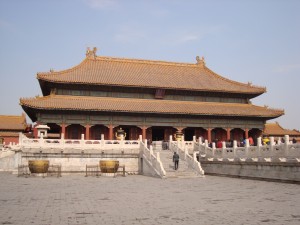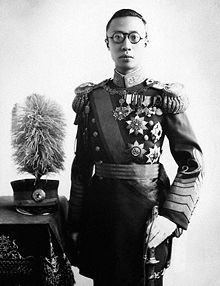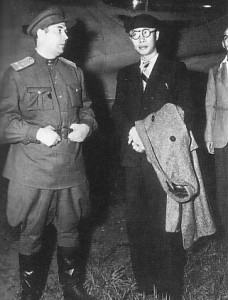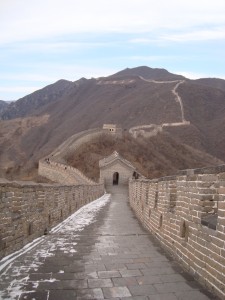From Mao-Tse Tung-er Deshe (In ‘Mao Tse-tung’s Country’ by Maulana Abdul Hamid Khan Bhashani), pp. 43-44
 I heard from Pu Yi’s own lips that the crown of China had been placed on his head when he was three years old and that he lost the throne three years later.
I heard from Pu Yi’s own lips that the crown of China had been placed on his head when he was three years old and that he lost the throne three years later.
Then at the age of 12 a warlord again proclaimed him king. But this time he sat on the throne for only a few days. After that ‘I became the king of Manchukuo. This was then a Japanese colony and I was a doll in the hands of the Japanese imperialists.’

The Japanese kept Pu Yi on the Manchu throne until their defeat in the Second World War, and inflicted terrible oppressions on the people of China, doing everything possible to thwart their aspirations for freedom. After the Japanese defeat the Soviet Union’s Red Army took the Manchu monarch Pu Yi prisoner and moved him to Russia.
Until the success of China’s revolution in 1949 he remained a prisoner in the Soviet Union. While living there Pu Yi wrote three letters to Stalin.

Pu Yi said: ‘In those letters I beseeched Stalin for only one thing – not to be sent back to China. Because it was my belief that to go back to China would mean certain death.’
Pu Yi told me the whole story of his return to China from the Soviet Union, so it is best that I recount it in his own words. ‘Soviet leaders wanted to send me back to China. I was stricken with terror. Those days were fraught with disquiet and nightmarish dreams. I thought, the Chinese Communist Party will never forgive me. I thought, how indeed could they forgive a king like myself, who had collaborated with the Japanese! My own thoughts reduced me to a state of terror. As you must know, in Chinese history whenever a new dynasty came to power, the dethroned kings would immediately lose their lives, along with their families. That is why I thought, now the Communists are in power, this means that it is my turn to lose my life.’
‘A day came when I really was sent back to China. Our train crossed the Soviet border and stopped at Mukden. At the station I saw that cars had been sent to receive us. Accompanying me on the same train were some erstwhile ministers of the Manchu empire. We were all convinced of our belief – we were to be taken straight to the execution ground. And at once a barrage of bullets would put an end to the illusions of this world (iholila). Our cars came to a halt in front of a big building. Later we learnt that this was an internal security office. We got out of the cars and began to advance towards the building. I was in the middle of the group. Someone said, Pu Yi should be in the lead. I interpreted this to mean that I’d be the first to be shot. I was taken to a room; on entering I saw a table piled with fruit, cakes, cigarettes and so on. I could not understand where I had been brought. After a while some high ranking officials entered the room. Their manner was polite and considerate. One of them remarked, we had traveled a great distance so we must be hungry. We should eat something. At that moment none of us had an appetite. In old China people who were destined for the gallows were always served good food before they were strung up. I thought, they’re probably observing that custom. I couldn’t take it any longer. I said, take us where you want without wasting any time. A perceptive official understood my state of mind and told me that I could see my nephew if I wished; he was an officer in the Chinese liberation Army and was in Mukden at the time. They would set up a meeting.
‘But with what face could I meet him? I was seized with shame.’


I like the movie the Last Emperor. The scene on the evening of 13th November 1908, without any advance notice, a procession of eunuchs and guardsmen led by the palace chamberlain left the Forbidden City for our home to inform my father that they were taking away his three-year-old son Pu Yi to be the new emperor.
I tried to write a blog about Pu yi, see whether you like it:
https://stenote.blogspot.com/2018/09/an-interview-with-pu-yi.html
Good blog… keep it up…. I remember Pu Yi once said: ” It was this tiny world where I was to spent the most absurd childhood possible until I was driven out by the National Army in 1924. I called it absurd bacuse at a time when China was called a republic and when time that mankind had advanced into the 20th century I was still living the life of an emperor, breathing the dust of the 19th century.”
I tried to write a blog about it, see whether you like it: https://stenote.blogspot.com/2018/09/an-interview-with-pu-yi.html